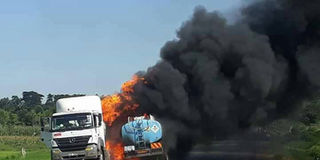Keep off fuel trucks involved in accidents

The fire that erupted after the fuel tanker overturned in Buseesa Village. Total fatalities in the two recent fuel accidents exceeds100 people and the last one burnt down most of Busesa trading center. Courtesy Photo
What you need to know:
The issue: Fuel tankers
Our view: We propose that the government must press the pedal harder on public awareness and safety precautions for all road users and residents and implement them to the letter.
On Sunday, three people were injured after two fuel tankers belonging to Nile Gaz Company went up in flames in Buseesa village, Ibulanku Sub-county in Iganga District. Luckily, this time, it was not like the event of about 17 years ago in December 2001, when 90 people were charred in the same village.
The history of such fires is common, for fuel tankers have highly flammable content and whose wide, moveable loads make them prone to rollovers, sometimes ramming into other road users or nearby buildings.
For instance, data this newspaper has compiled over the years indicates that on December 15, 2004, 12 people died when a fuel tanker, two trailers and a pick-up truck collided on the Jinja-Iganga road. In February 2005, 45 people burnt to death after a minibus, a fuel tanker and a car collided at Lwankima in Mabira forest. On July 30, 2006, 30 people were killed when a fuel tanker collided with a minibus at Kitega hill on Kampala-Jinja road.
A month later in August 2006, 27 passengers died after their minibus collided head-on with a fuel tanker on the Kampala-Jinja road, 3km from Lugazi town. The petrol fumes killed another three trying to steal fuel from the tanker.
The most memorable one is the incident of June 30, 2013, when at least 30 people perished in a fuel tanker inferno on the Northern Bypass in Namungoona, Kampala, in what investigators concluded was a self-inflicted accident.
Reports documented by this newspaper are that whenever fuel trucks overturn or crash, residents quickly hurry to the scene to scoop free fuel and make a dime on the black market. Yet even with all the deaths and damage caused by the explosions, people do not take home any lessons. We propose that the government must press the pedal harder on public awareness and safety precautions for all road users and residents and implement them to the letter.
The police must endeavour to keep away members of the public from such accident scenes and make a pedantic effort to arrest those caught siphoning fuel. Local authorities on these highways should be encouraged to alert police of any accident; and police should respond immediately. Secondly, the region can borrow a leaf from Western countries where vehicles carrying dangerous goods are fitted with electronic stability control (ESC) and anti-locking braking system (ABS), both high-tech braking systems.
This ensures that such trailers or trucks are stable on the road, on bends and their speed is regulated. The drivers should also be regulated and companies mandated to employ more than one driver for such routes to avoid accidents that might arise from fatigue.




